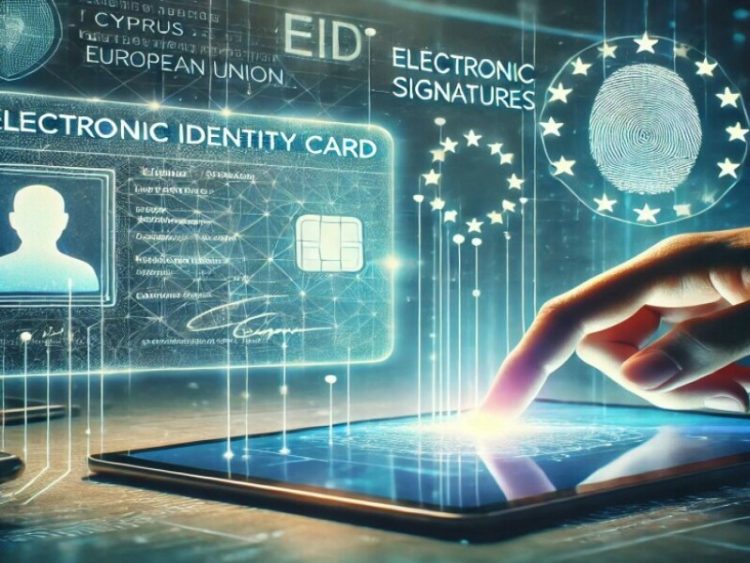Exploring the Cyprus Electronic Identity Card (eID) and E-Signature System: A New Era of Digital Transformation
The digital revolution has reached new heights in Cyprus, with the government introducing the Electronic Identity Card (eID) and Electronic Signatures (e-signatures). These innovative tools are central to Cyprus’ commitment to digital transformation, providing citizens and businesses with secure, efficient, and legally recognized solutions for online transactions and services.
This article will explore the features, benefits, and applications of the eID and e-signature system, as well as how they align with European Union (EU) standards, enhancing trust and interoperability across borders.
What Is the Cyprus eID?
The Electronic Identity Card (eID) is a digital identity tool designed to authenticate Cypriot citizens in online environments securely. Acting as a digital passport, the eID enables users to access a variety of public and private services, eliminating the need for physical presence or manual paperwork.
Compliant with the EU’s eIDAS Regulation (Regulation (EU) No 910/2014), the eID is recognized across all EU member states, ensuring seamless cross-border use. This cutting-edge solution represents a key milestone in Cyprus’ digital modernization efforts, facilitating the adoption of secure and transparent electronic transactions.
Core Features of the Cyprus eID
- Single Digital Identity
The eID consolidates a citizen’s identification needs into one secure platform. It eliminates the requirement for multiple online credentials, allowing users to access various services with one secure identity. - Legally Binding E-Signatures
One of the most transformative features of the eID is its ability to facilitate electronic signatures. These e-signatures are legally equivalent to handwritten signatures and are valid for legal contracts, business transactions, and official documents. - EU-Wide Interoperability
The eID’s compliance with the eIDAS Regulation ensures that it is interoperable across the European Union. Whether you need to sign a contract in another EU country, register a business, or access online public services, the eID provides a seamless experience. - High-Level Security
Designed with advanced encryption and two-factor authentication (2FA), the eID guarantees the confidentiality and integrity of user data, ensuring protection from identity theft and fraud. - User-Friendly Accessibility
The eID system is designed to be intuitive, making it accessible to individuals with varying levels of technical expertise. Users can manage their eID credentials, update information, and utilize e-signatures easily through government and private sector portals.
Eligibility and Application for an eID in Cyprus
Obtaining an eID in Cyprus is a straightforward process, governed by Article 65A of the Civil Registry Law of 2002 (L.141(I) 2002). Below are the eligibility requirements:
- Cypriot Citizenship: Applicants must be citizens of the Republic of Cyprus.
- Age Requirement: Individuals must be at least 18 years old.
- Valid Biometric Identity Card: The applicant must possess a valid biometric ID issued by Cypriot authorities.
- No Existing eID: Applicants must not already have an active eID.
How to Apply for an eID
The application process for the eID can be completed online or in person at designated offices. Upon verification of the applicant’s information, the Civil Registry Department will issue the eID within five business days. The eID has a validity period of three years, with options for renewal.
What Are E-Signatures?
Electronic signatures (e-signatures) are a crucial component of Cyprus’ digital identity system. E-signatures are secure, digital alternatives to handwritten signatures, allowing users to sign documents remotely while maintaining legal validity. With the integration of e-signatures into the eID system, Cypriot citizens and businesses can transact with confidence in both domestic and cross-border contexts.
Benefits of E-Signatures in Cyprus
- Full Legal Recognition
Under the eIDAS Regulation, e-signatures in Cyprus are recognized as legally binding across the European Union. This eliminates barriers to cross-border transactions and ensures the validity of digital documents in legal proceedings.
- Time and Cost Efficiency
E-signatures replace time-consuming, paper-based processes, reducing costs associated with printing, postage, and physical storage. Businesses and individuals can now execute contracts, applications, and other formalities faster than ever.
- Improved Accessibility
Remote signing capabilities mean that users can sign contracts or submit applications from anywhere, at any time. This feature is especially beneficial for businesses with global operations and employees working across different locations.
- Enhanced Security
E-signatures use public key infrastructure (PKI) and cryptographic protections to secure transactions, ensuring the authenticity of the signer’s identity and the integrity of signed documents.
- Sustainability
By reducing the reliance on paper, e-signatures contribute to environmental sustainability, aligning with global efforts to minimize carbon footprints.
Applications of the eID and E-Signatures
The introduction of the eID and e-signature system has transformed the way citizens and businesses interact with public and private entities. Some of the most prominent applications include:
- Public Sector Services
•Government Portals: Citizens can securely log in to government websites, such as Ariadni, to access services like tax filing, pension applications, and land registry submissions.
•E-Governance: Digital signatures simplify document submission for permits, licenses, and public records.
- Corporate Transactions
•Business Registration: Entrepreneurs can register new companies entirely online via the Department of Registrar of Companies and Official Receiver.
•Digital Contracts: Shareholder agreements, partnership contracts, and resolutions can be securely signed electronically, reducing administrative overheads.
- Financial Services
•Client Onboarding: Banks and financial institutions use e-signatures to comply with KYC (Know Your Customer) and AML (Anti-Money Laundering) regulations.
•Loan Approvals: Customers can electronically sign loan agreements and investment contracts, enabling faster processing.
- Real Estate
•E-signatures simplify real estate transactions by enabling remote signing of purchase agreements, lease contracts, and mortgage applications.
- Healthcare
•Patients can use their eID to securely access medical records and sign consent forms for procedures.
•Medical professionals can issue e-prescriptions and other official documents digitally.
- Education
•Universities and schools can use e-signatures for admissions, diplomas, and certificates, ensuring secure and paperless processes.
Security Features of the eID and E-Signature System
Security is a top priority in the design of Cyprus’ eID and e-signature system. Key features include:
- Encryption
Advanced encryption techniques ensure the confidentiality of all transactions conducted with the eID. - Biometric Verification
The eID includes biometric data, such as fingerprints, for secure and accurate identification. - Revocation Mechanisms
Users can immediately revoke their eID credentials if lost or compromised, minimizing the risk of misuse. - Fraud Detection
The system integrates real-time fraud detection capabilities, ensuring the authenticity of every transaction.
The Future of Digital Identity in Cyprus
The introduction of the eID and e-signature system is just the beginning of Cyprus’ digital transformation. Anticipated future developments include:
- Mobile eID Solutions: Efforts are underway to integrate the eID into mobile platforms for even greater convenience.
- Blockchain Integration: Blockchain technology could enhance the security and transparency of transactions conducted with the eID.
- Advanced AI Verification: Artificial intelligence could streamline identity verification and fraud prevention.
Conclusion
The Cyprus eID and e-signature system represents a landmark achievement in the nation’s journey toward digital modernization. By enabling secure, efficient, and legally recognized digital transactions, the system empowers citizens and businesses to operate in a globalized digital economy with confidence. From simplifying public services to enhancing cross-border business opportunities, the eID and e-signature system is a transformative tool that ensures Cyprus remains at the forefront of digital innovation.
Contact Information:
Simon Zenios & Co LLC
Phone: 00357–24 02 33 70
Email: lawfirm@advocatescyprus.com
Visit Our Website: Simon Zenios & Co LLC
Disclaimer: This article is for informational purposes only and does not constitute legal advice. Companies are encouraged to seek professional legal and tax advice to understand the specific implications of the Cyprus eID and e-signature system for their business.










